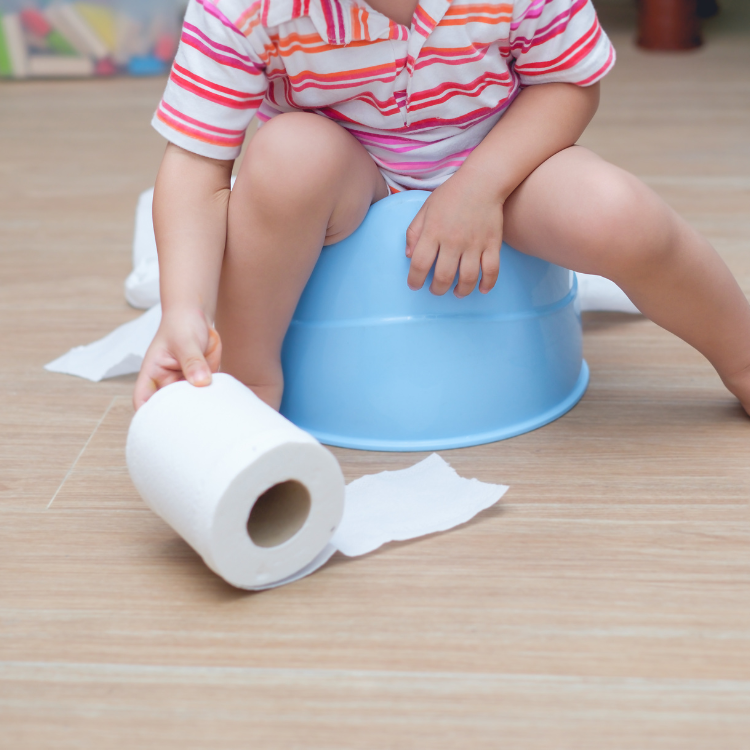
Potty training can be a very daunting idea for parents. When to start, how to approach the process, which potty training supplies to purchase, how to encourage and motivate your child… As a Pediatric pelvic floor physical therapist, I’m often asked how to approach potty training. I like to preach simplicity and I encourage families to scrap the process if it begins to feel too difficult. In fact, if you speak with the Pediatric Urology team at Lurie Children’s Hospital of Chicago, they believe that toilet training develops in its own time for every child. Just as you don’t teach your child how to crawl, walk, or speak, your child will develop continence without specific intervention.
However, they also understand that parents look for tips and direction. And their biggest recommendation for those who attempt a dedicated toilet training process is to stop if your child doesn’t achieve continence in a week. In that case, you should hold off and wait until a better time. Every child toilet trains in their own time; however, the following tips will hopefully make the process feel less intimidating when you and your child are ready to begin.
Children will start to show signs when they’re ready to start potty training. These signs indicate your child is aware of voiding. And this awareness shows potential for control over their voiding habits:
It’s important to wait until your child starts to show these signs. If you begin training prior to this, your child is likely not ready. And the process will be very frustrating.

Even though your child may be able to control their voiding habits, it’s important that the child is also motivated to participate in the potty training process. If your child is showing some signs of control but is adamantly opposed to sitting on the toilet to void, try to understand why. If they’re scared or nervous, try to show understanding and validation while normalizing it. And once those variables have been taken out of the equation, try to think about what will best motivate your child: big kid underwear, certain prizes or privileges, etc. However, if these things don’t result in motivation for your child, it may not be the right time to potty train them. I would encourage you to wait a bit and try again in the future.
Kids are MUCH smaller than adults. And standard toilets are made for adults. As such, it’s important to have appropriately sized toilets and supplies to set your child up for success. You can utilize a toilet seat insert to make the toilet opening narrower. Or you can place a small toilet on the ground in the bathroom. If you choose the former, ensure your child also has foot support with the use of a step stool.
When voiding, your child’s feet should be supported so their muscles can relax and allow their body to void. You should also help make sure your child knows how to properly sit on the toilet:
When starting to potty train, it won’t be instinctual for your child to immediately go to the bathroom with every urge. So prompt your child to try to use the bathroom. Do not to ask if your child needs to use the bathroom, because they are likely not yet aware of what that urge is and so will probably say no. Instead, every one or two hours, tell your child it’s time to try to use the bathroom. Then go together, show them their designated setup. And encourage them to sit down and try to breathe.
If they don’t void after one or two minutes, they can get up and go about their day. Reward them for trying! They don’t yet have control over voiding, but they do have control over making the effort. And it’s important to reward that.

As stated above, your child will not yet be able to control every urge and void, but there are certain actions over which they do have control. You can reward them for sitting down on the toilet when prompted by a caregiver, for sitting correctly and for the designated amount of time, for taking three to five deep breaths while sitting on the toilet, etc. It’s important to reward the positive actions rather than solely rewarding the physical act of voiding on the toilet.
Accidents WILL happen. Your child will not automatically be continent after one day. During the potty training your process, your child is learning what an urge feels like, how much time is required to get to the bathroom, how to properly sit on the toilet, etc. Accidents come with the learning process, so it’s crucial not to punish them. Children aim to please, and if they’re punished for accidents, they may hide their accidents or learn holding habits. Instead, try to help your child understand what their body was feeling in that moment and how they can respond to those urges more quickly in the future.
To reiterate, each child will potty train on their own time. For some children, it’s as early as 18 months, but for most it’s typically around 2-3 years old. There’s no standard age, and unless there’s a neurological or developmental reason working against them, each child will eventually potty train. But it’s crucial not to force the process: This can result in poor voiding habits, potentially contributing to bowel and bladder dysfunction in the future. Each child is unique, and just as with gross motor milestones (sitting, crawling, walking, etc.), continence will also develop in its own time.
If at any point you feel like your child isn’t responding typically to the potty training process or if accidents start again after your child has been continent for a sustained period, don’t hesitate to speak with your doctor! There are plenty of other factors at play with urination and defecation (constipation, urinary tract infections, holding habits, etc.), and there could be more contributing to your child’s behaviour than you know. Your child may benefit from more specialised intervention with a Urology team, behavioural intervention, or potentially physical therapy.



Comments (0)